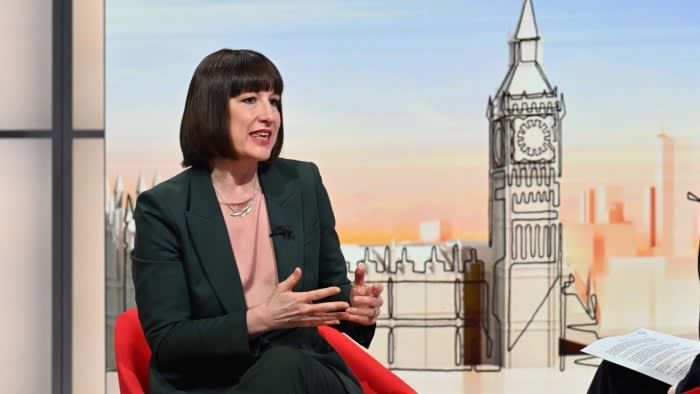Rachel Reeves warns of challenge facing Labour if the party wins election

Keep yourself up-to-date with complimentary notifications.
Just register for the myFT Digest for UK taxes and it will be sent straight to your email inbox.
Rachel Reeves acknowledges that the road ahead for Labour, if voted into power, will not be easy as the government has implemented two of their policies to finance tax reductions. She is aware of the difficulty that the party will face.
The opposing finance minister mentioned in an interview with the BBC this past Sunday that if the Labour party were to take power, they would conduct a review of their expenditures soon after being inaugurated. However, she was unable to guarantee that there wouldn't be any reductions in government services.
Reeves stated that she will meticulously search for sources of funding to support Labour's expenditure proposals, following Chancellor Jeremy Hunt's adoption of the party's initiatives to abolish the non-dom taxation policy and prolong the oil and gas bonus levy.
To be truthful, we cannot make an immediate improvement. However, we plan on taking action towards resolving those issues.
Hunt revealed a decrease of 2 pennies in national insurance that will take away £10bn from the budget yearly. After this announcement, she expressed her opinion. Some voters are still undecided whether they would prefer lesser tax or more public expenses.
Ipsos pollsters have discovered that roughly 36% of voters desire a rise in the expenditure allocated towards the public system, causing a potential increase in taxes. This percentage is higher than the 33% of voters who would prefer the government offering tax cuts.
Conservative Members of Parliament (MPs) are worried that the Budget scheduled for Wednesday may not have a significant impact on voters, with a few describing it as an unexciting budget.
On Sunday, Prime Minister Rishi Sunak declared that the government's goal is to completely eliminate national insurance in the upcoming parliamentary session to put an end to the unjust practice of "double taxation," involving income tax and national insurance.
During a conversation with the Sunday Times, Sunak stated that he intends to hold discussions on fresh proposals to decrease benefits intended for working-aged individuals in order to secure the funds needed for more tax cuts.
He said that currently, there are approximately 2.5 million individuals of working age who have been certified as incapable of working.
The Labour party has claimed that doing away with national insurance would result in a loss of £46bn annually. They have criticized the government for making an unsupported fiscal promise, a claim that the Conservative party has rejected.
According to the Budget documents, the non-doms, wealthy residents with a permanent home overseas, will be subject to Hunt's new regime, which is predicted to produce revenue of £3.6bn annually. Additionally, the expansion of the power tariff will collect over £1bn in 2028-29.
The Labour party had set aside the income generated by these actions to support breakfast clubs for young students and assist in financing efforts to achieve zero net emissions.
Hunt's financial plan set aside an allowance for public expenditures to increase by a percentage of 1 annually, in comparison to inflation. Meanwhile, the amount of spending per individual would remain steady for the remainder of the decade.
However, since major sectors such as healthcare have been offered greater funding, non-protected divisions could potentially suffer a decrease in funding that equates to around 3.3 percent annually, as stated by the Institute for Fiscal Studies.
On Sunday, the Labour party revealed that they had appointed Mark Carney, the ex-governor of the Bank of England, and CS Venkatakrishnan, the CEO of Barclays, to advise on their proposed £7.3bn national wealth fund. This fund aims to invest in the reduction of carbon emissions in the heavy industry sector.
During the following three-month period, the task force has plans to meet with potential investors. The Labour party has expressed its desire to encourage an influx of £3 from the private industry for every pound of government-backed investment.









































